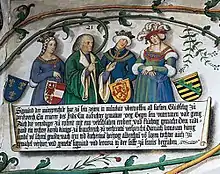Radegonde of Valois
Radegonde of Valois (born in Chinon in 1425/August 1428 and died in Tours on 19 March 1445) was a French princess, eldest daughter of King Charles VII of France and Marie of Anjou. She was betrothed to Sigismund, Archduke of Austria.
| Radegonde of Valois | |
|---|---|
 | |
| Born | 1425/August 1428 Chinon |
| Died | 19 March 1445 Tours |
| Burial | Saint-Gatien cathedral of Tours |
| House | Valois |
| Father | Charles VII of France |
| Mother | Marie of Anjou |
Biography
Radegonde was born in the city of Chinon in 1425[1] or August 1428, as evidenced by an act of the Queen's Treasurer General dated 29 August that year, referring to the "gesine recently made in the city of Chinon, Madame Arragonde of France"[2]
The young princess, the eldest daughter of the king, was baptized in honour of Saint Radegund, to whom her father devoted a particular cult. According to Christian de Mérindol, this choice was explained by reasons both political, historical and religious, in this particular context of reconquest of the kingdom of France on the English:
"The name of Radegonde had several meanings: symbol of the city of Poitiers, seat of the second Parliament, so place of resistance in Paris, in the hands of the English and Burgundians, symbol of legitimacy, because the saint was the wife of Clotaire, the son of Clovis, finally a saint who could only attract the graces of heaven, so necessary to the young king. "[3]
She is the only princess of royal blood to have borne this name within the Capetian lineage.[4]
On 22 April 1430 her father promised her in marriage to Sigismund, son of the Archduke Frederick of Austria, Count of Tyrol.[5]

She became ill in Tours in 1445, perhaps suffering from pleurisy contracted after returning on foot from a pilgrimage to the Basilica of Notre-Dame de l'Epine.[6]
She died on 19 March, at the age of 19 years.[lower-alpha 1][7]
She is buried in the Saint-Gatien cathedral of Tours.[7]
Notes
- Watanabe states Radegonde died in February 1445 at the age of nineteen.[5]
References
- Debris 2005, p. 361.
- de Beaucourt 1888, p. 187.
- Christian de Mérindol, « Le culte de sainte Radegonde et la monarchie française à la fin du Moyen Âge », dans Les Religieuses dans le cloître et dans le monde, des origines à nos jours, Actes du deuxième colloque international du C.E.R.C.O.R., Poitiers, 29 septembre-2 octobre 1988, Saint-Étienne, Publications de l'Université de Saint-Étienne, 1994, p. 792.
- Robert Favreau, « Le culte de sainte Radegonde à Poitiers au Moyen Âge », dans Les religieuses dans le cloître et dans le monde des origines à nos jours: Actes du deuxième colloque international du C.E.R.C.O.R., Poitiers, 29 septembre-2 octobre 1988, Saint-Étienne, Publications de l'Université de Saint-Étienne, 1994, p. 107.
- Watanabe 2011, p. 105.
- P.L Carrez, Étude sur le château de Sarry, ancienne campagne des évêques de Châlons-sur-Marne, imp. Martin Frères, Châlons, 1899.
- de Beaucourt 1888, p. 94.
Sources
- de Beaucourt, Gaston du Fresne (1888). Histoire de Charles VII. Vol. IV : L'expansion de la royauté, 1444-1449 (in French). Paris: Librairie de la Société bibliographique. p. 94 and note 4.
- Debris, Cyrille (2005). "Tu Felix Austria, nube" la dynastie de Habsbourg et sa politique matrimoniale à la fin du Moyen Age (XIIIe-XVIe siècles) (in French). Brepols.
- Watanabe, Morimichi (2011). Christianson, Gerald; Izbicki, Thomas M. (eds.). Nicholas of Cusa: A Companion to his Life and his Times. Ashgate Publishing.